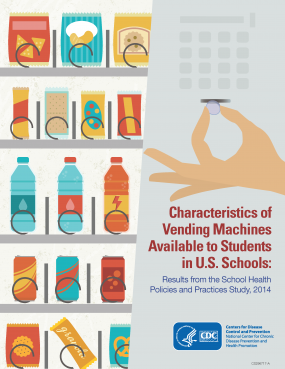Smart Snacks and School Vending Machines
What are Smart Snacks in School?
Smart Snacks in School refers to the national nutrition standards for foods and beverages sold outside of the federal reimbursable school meal programs during the school day. These items are called “competitive foods” because they can compete with participation in school meal programs.
As of the 2014–2015 school year, all competitive foods and beverages sold during the school day must meet or exceed Smart Snacks in School nutrition standards, which include limits on fat, sugar, sodium, and calorie content. These standards are the minimum requirement for schools, but states and local education agencies can continue to implement stronger nutrition standards for all competitive foods in schools.

School vending machines are one venue where schools may sell competitive food and beverages during the school day.
As part of the School Health Policies and Practices Study, 2014, CDC analyzed photographs of a nationally representative sample of school vending machines available to students prior to the Smart Snacks implementation.
The report, Characteristics of Vending Machines Available to Students in U.S. Schools: Results from the School Health Policies and Practices Study, 2014 [PDF – 10 MB], highlights key findings including
- Descriptions of machine type.
- Prevalence of specific foods and beverages.
- Marketing on machines.
Although school vending machines can be a convenient source of food and beverages throughout the day, the items sold should be healthy options. Local education agencies should ensure that local school wellness policies include Smart Snacks standards for vending machines, and schools should make sure that foods and beverages in vending machines meet the standards.
